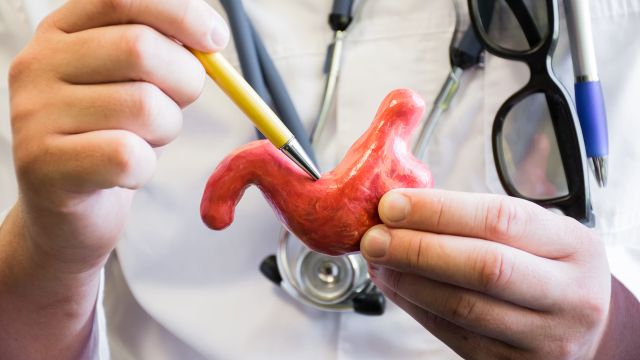Updated on June 5, 2024.
Gastroesophageal junction adenocarcinoma is a rare type of cancer that begins in the gastroesophageal junction, or GEJ. The GEJ is the part of the body that connects the lower part of the esophagus (called the distal esophagus, the tube that brings food from the mouth to the stomach) to the upper part of the stomach (called the proximal stomach).
Because the GEJ is located between two major digestive organs, the esophagus and the stomach, there has been some debate whether the disease should be considered an esophageal cancer or a stomach cancer. Though health experts still disagree on this subject, research suggests that GEJ cancers are more like cancers of the esophagus, and are diagnosed and treated like esophageal cancers.
Controllable risk factors
A risk factor is something that increases the chances of developing a medical condition. While the exact cause of GEJ cancer is unknown, there are a number of factors that can increase a person’s risk of having GEJ cancer. As with many other health conditions, certain habits and lifestyle factors can increase risk. These include:
- Smoking, or using any type of tobacco product, including chewing tobacco
- Being obese
- Consuming alcohol in excess
- Eating a diet high in red meat and processed meat
How can you help reduce your risk of GEJ and esophageal cancers, as well as many other diseases?
- Quit tobacco (if you use tobacco products)
- Maintain a healthy weight
- Limit alcohol consumption
- Eat a healthy diet high in fruits, vegetables, whole grains, and lean proteins and low in salt, added sugars and saturated fats (which are solid at room temperature, like butter)
Uncontrollable risk factors
There are also a number of risk factors that are beyond a person’s control. These include:
- Sex at birth: GEJ cancer is more common in people assigned male at birth
- Age: GEJ cancer is more common as people age; most people who develop this type of cancer are over the age of 55
- Certain other health conditions
GERD and other health conditions
A number of other health conditions, particularly those that affect the esophagus, also increase the risk of GEJ cancer (as well as esophageal cancer). These include:
- GERD: Also known as gastroesophageal reflux disease, it's a condition where stomach acid rises out of the stomach and into the esophagus.
- Barrett’s esophagus: This is a condition that can lead to cancer and can develop as a result of years of GERD. With Barrett’s esophagus, persistent acid reflux causes permanent damage to the lining of the esophagus.
- Achalasia: At the bottom of the esophagus is a sphincter, a ring of muscle that opens and closes to allow food to pass through, while keeping the contents of the stomach from rising back up. In people with achalasia, this muscle doesn’t function properly so that food and liquid does not pass as well into the stomach.
While these conditions increase the risk of developing GEJ by only a small percent, persistent heartburn or reflux should not be ignored because it can lead to other complications that affect the esophagus, including inflammation (esophagitis), sores (ulcers) and narrowing (strictures).







